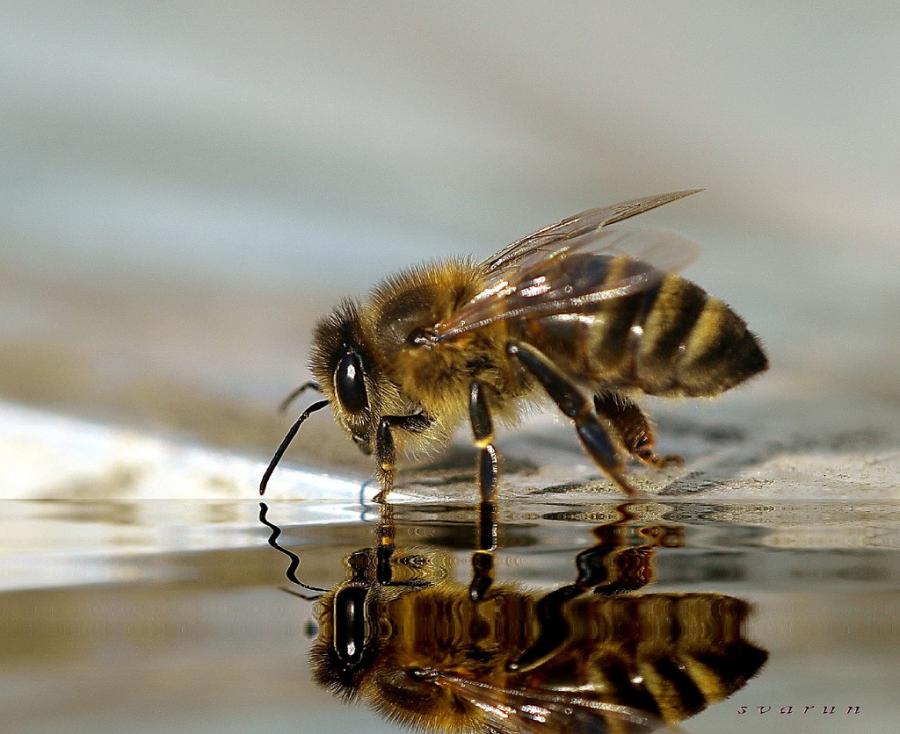USGS Study: Dangerous Bee-Killing Neonicotinoids Found in Iowa’s Drinking Water

(EnviroNews USA Headline News Desk) — Neonicotinoids, which are powerful insecticides and neurotoxins, have been found in the finished drinking water of two Iowa public water facilities. These chemicals were detected by U.S. Geological Survey (USGS) researchers, whose findings were published in a study titled, Occurrence of Neonicotinoid Insecticides in Finished Drinking Water and Fate during Drinking Water Treatment with the American Chemical Society (ACS). USGS specifically looked for clothianidin, imidacloprid and thiamethoxam and also evaluated the water treatments at the facilities.
These three neonicotinoids were found at a concentration between 0.24 and 57.3 nanograms per liter, which is in the range of parts per trillion. Modern Farmer states even a low concentration of these toxins “should serve as a huge alert that we need to know more, and quickly, about the effects of these pesticides. After all, we’re drinking them.”
The study explains these poisons harm pollinators and that chronic exposure has been linked to adverse neurological and development outcomes as well as liver and central nervous system inflammation in non-target organisms (such as humans). In 2016, after years of pressure from environmentalists and beekeepers, the Environmental Protection Agency (EPA) finished a neonicotinoid risk assessment and concluded the chemicals were harmful to pollinators.
Over the past few years, U.S. beekeepers have suffered unsustainable losses, which directly threaten the stability of the country’s food system. As Dennis vanEngelsdorp, a University of Maryland bee scientist, told The Guardian, “One in three bites of food we eat is directly or indirectly pollinated by bees.” In January 2017, the rusty patched bumble bee (Bombus affinis) was the first bumble bee to be listed as an endangered species in the U.S.
Neonicotinoids are the most widely used insecticides in both the U.S. and globally. A 2016 nationwide water-quality study on streams found them in 63 percent of the waterways tested. In 2014, they were detected in every stream sampled in a high corn and soybean-producing region in the Midwest.
According to the Iowa USGS study abstract, the insecticides were “ubiquitously detected” in water that had already been treated at the University of Iowa treatment facility. However, they were “substantially lower” at the Iowa City treatment facility, which used granular activated carbon (GAC) filtration.
“GAC filtration presents a treatment option for removal of neonicotinoids in resource-constrained communities that rely on agriculturally impacted surface waters or point-of-use systems that [are] substantially more economical than reverse osmosis or advanced oxidation processes,” the researchers concluded.
In related neonicotinoid news, in February 2017, state Senators Ben Allen (D-Santa Monica) and Scott Wiener (D-San Francisco) introduced SB 602, AKA the Pollinator Protection Act. This bill seeks to regulate neonicotinoids in California for professional use and inform consumers about plants and seeds that have been treated with these chemicals. Agricultural products containing neonicotinoids would also be required to bear the following statement: “STATE OF CALIFORNIA SAFETY WARNING: MAY HARM BEES.”
In March 2017, The Guardian reported it had gained access to draft regulations from the European Commission, which seek to ban neonicotinoid use on all fields throughout Europe. If approved, the ban could be put in place during 2017. The European (EU) also approved a temporary, limited neonicotinoid ban in 2013.
RELATED FROM ENVIRONEWS:
USDA Analysis: U.S. Beekeepers Lose A Staggering 44% of Hives in 2015-16
(EnviroNews World News) – Washington D.C. – A preliminary analysis released May 4, 2016, by the U.S. Department of Agriculture (USDA), shows American beekeepers lost a stunning number of hives from April of 2015 through March of 2016. The research was carried out by The Bee Informed Partnership…
FILM AND ARTICLE CREDITS
- Julia Travers - Journalist, Author



